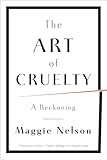

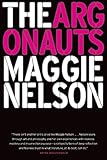 The first book I remember reading this year was an advance copy of Maggie Nelson’s The Argonauts, handed to me by my friend Amanda. I had a six-month-old baby, and Amanda and I had both, coincidentally, just moved from New York to Portland. I am sure I’d read things in the first six months of my son’s life, but I don’t remember any of them. I think mostly I tweeted and Googled paranoid things late at night. She pressed this book to me and I read it on a car ride out to the Oregon coast, baby napping in his car seat. At first it made me mad, all the theory getting in the way of what I really wanted, THE LIFE OF MAGGIE. She is one of those people for me, writers who I want to cross all boundaries with, writers from whom I ask too much. She makes me want more than, as a reader, I deserve. She already gives us more than we deserve. It isn’t fair. I read about how she put a laminated copy of her Guggenheim fellowship announcement (given to her by her mother) under her son’s high chair to catch everything he tossed, and my heart soared. I got used to the theory, came to love it. I read the book a few times over. Then I read Bluets again. Then I ordered The Art of Cruelty, and was told we already owned a copy. Actually I put it on the stoop before we left New York. It was a galley, I rationalized. But really, that book makes me mad. It’s hard to get into and it isn’t Bluets — this is how unfair I am to Maggie. I always call her Maggie in my mind. Anyway, in my newly regained readerly flush I paid for this book and it’s still on my nightstand. I haven’t been able to get through the first few pages. I am an apostate, I know it. Still, though, I think of this as the year of Maggie Nelson, for the world and, more specifically, for me. She brought me back into loving reading.
The first book I remember reading this year was an advance copy of Maggie Nelson’s The Argonauts, handed to me by my friend Amanda. I had a six-month-old baby, and Amanda and I had both, coincidentally, just moved from New York to Portland. I am sure I’d read things in the first six months of my son’s life, but I don’t remember any of them. I think mostly I tweeted and Googled paranoid things late at night. She pressed this book to me and I read it on a car ride out to the Oregon coast, baby napping in his car seat. At first it made me mad, all the theory getting in the way of what I really wanted, THE LIFE OF MAGGIE. She is one of those people for me, writers who I want to cross all boundaries with, writers from whom I ask too much. She makes me want more than, as a reader, I deserve. She already gives us more than we deserve. It isn’t fair. I read about how she put a laminated copy of her Guggenheim fellowship announcement (given to her by her mother) under her son’s high chair to catch everything he tossed, and my heart soared. I got used to the theory, came to love it. I read the book a few times over. Then I read Bluets again. Then I ordered The Art of Cruelty, and was told we already owned a copy. Actually I put it on the stoop before we left New York. It was a galley, I rationalized. But really, that book makes me mad. It’s hard to get into and it isn’t Bluets — this is how unfair I am to Maggie. I always call her Maggie in my mind. Anyway, in my newly regained readerly flush I paid for this book and it’s still on my nightstand. I haven’t been able to get through the first few pages. I am an apostate, I know it. Still, though, I think of this as the year of Maggie Nelson, for the world and, more specifically, for me. She brought me back into loving reading.
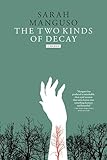
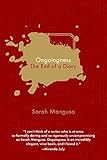 I read Sarah Manguso’s Ongoingness soon after, the Graywolf one-two punch of 2015, but it just made me want to reread Manguso’s book The Two Kinds of Decay, which is such a mean thing to say, I know. Anyway I did reread it, in the mornings before settling into writing for a few weeks. Reading someone else’s book during the work day feels like the ultimate indulgence to me. It makes me anxious, but then the words, the voice, the confidence (if it’s the right book) soothe it, too. I’m not sure it serves as anything more than a more virtuous, exciting way to procrastinate. Even still: Grace Paley, Nora Ephron, Manguso, they all put the voice back in my head, helped settle the whirling panic and reform it into something more confident and at ease. I felt like they were the band playing me in.
I read Sarah Manguso’s Ongoingness soon after, the Graywolf one-two punch of 2015, but it just made me want to reread Manguso’s book The Two Kinds of Decay, which is such a mean thing to say, I know. Anyway I did reread it, in the mornings before settling into writing for a few weeks. Reading someone else’s book during the work day feels like the ultimate indulgence to me. It makes me anxious, but then the words, the voice, the confidence (if it’s the right book) soothe it, too. I’m not sure it serves as anything more than a more virtuous, exciting way to procrastinate. Even still: Grace Paley, Nora Ephron, Manguso, they all put the voice back in my head, helped settle the whirling panic and reform it into something more confident and at ease. I felt like they were the band playing me in.
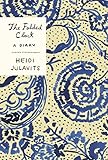
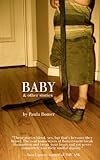
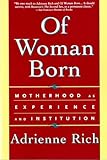 When a certain ferocity was needed, I listened to Sylvia Plath read her own work on Spotify. Afterward, I started reading parts of her journal. Her mundane anxiety about publishing her work, applying to residencies, and walking to the mailbox looking for checks is what made me put it down. Not today, Sylvia. Not today. Same goes for Adrienne Rich’s Of Woman Born. And Paula Bomer’s Baby & Other Stories. I recommend these in a certain state of mind, when you can handle them. It’s important to know when you can’t. This is a skill I’ve yet to master.
When a certain ferocity was needed, I listened to Sylvia Plath read her own work on Spotify. Afterward, I started reading parts of her journal. Her mundane anxiety about publishing her work, applying to residencies, and walking to the mailbox looking for checks is what made me put it down. Not today, Sylvia. Not today. Same goes for Adrienne Rich’s Of Woman Born. And Paula Bomer’s Baby & Other Stories. I recommend these in a certain state of mind, when you can handle them. It’s important to know when you can’t. This is a skill I’ve yet to master.
If it was the year of Maggie Nelson, for me, it was also the year of Heidi Julavits. She’s “Heidi J” to me and my writer-reader friends, because we refer to her constantly. Her book The Folded Clock came out in earlyish spring and this book and iced coffee were about all I saw on Instagram, and all I cared to see. At first I thought it was the Leanne Shapton cover, but it goes deeper. It’s a book that seems effortless, which means it was brilliantly engineered. The kind of book that makes you happy to have to wait somewhere, because you have it in your totebag; happy to go to bed early so you can sit up reading it. I saw Heidi J read one night at Powell’s and my friend and I left immediately to get a drink. She was so funny, so charming, so effortlessly beautiful (like her writing!), we sat in the car sighing. “Her kids are older right?” Right. She makes me excited to be a decade older, to be more settled into life, to work my ass off and to know myself. This, and the hidden work of the book, is its power.

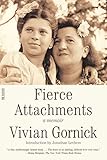
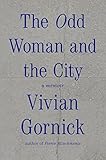 On the occasion of Vivian Gornick’s The Odd Woman and the City being published, and a friend texting me photos of random pages of Gornick’s backlist, I said, Fine, and ordered a bunch of her books from Powell’s. I’d read her best book, Fierce Attachments on a road trip a few years ago; I was 30 weeks pregnant and the bookstore owner confessed she was pregnant, too. When she sighed and proclaimed her love for the book as she rung up my purchase, I knew it was brought to me by fate. We became friends and I sent her a box full of baby clothes. I read the rest of Gornick’s books this year like they were the key to something, though none of them touches Fierce Attachments. The End of The Novel of Love felt a lot like a brilliant incisive woman writing on Tumblr, full of the sort of projection and assumption and familiarity that is absent from more traditional criticism. In other words, I loved it. The Situation and the Story was that kind of clarifying reading experience where the clarity might be a delusion but at least you have the confidence, the reassurance, of clarity. Months later I couldn’t tell you what I took from The Situation and The Story aside from that mental cheering and gratitude for a book coming into your life at the exact right time you think you need it (for me, I was finishing a nonfiction book proposal). The Odd Woman And The City itself seemed sharp and funny and a little sad. Did it ever really cohere? Transcend? I’m not sure, but I am grateful to have spent time inside her head.
On the occasion of Vivian Gornick’s The Odd Woman and the City being published, and a friend texting me photos of random pages of Gornick’s backlist, I said, Fine, and ordered a bunch of her books from Powell’s. I’d read her best book, Fierce Attachments on a road trip a few years ago; I was 30 weeks pregnant and the bookstore owner confessed she was pregnant, too. When she sighed and proclaimed her love for the book as she rung up my purchase, I knew it was brought to me by fate. We became friends and I sent her a box full of baby clothes. I read the rest of Gornick’s books this year like they were the key to something, though none of them touches Fierce Attachments. The End of The Novel of Love felt a lot like a brilliant incisive woman writing on Tumblr, full of the sort of projection and assumption and familiarity that is absent from more traditional criticism. In other words, I loved it. The Situation and the Story was that kind of clarifying reading experience where the clarity might be a delusion but at least you have the confidence, the reassurance, of clarity. Months later I couldn’t tell you what I took from The Situation and The Story aside from that mental cheering and gratitude for a book coming into your life at the exact right time you think you need it (for me, I was finishing a nonfiction book proposal). The Odd Woman And The City itself seemed sharp and funny and a little sad. Did it ever really cohere? Transcend? I’m not sure, but I am grateful to have spent time inside her head.
After that, propelled forward by fate, the final Neapolitan novel from Elena Ferrante was coming out, so I finally GAVE IN and bought the first two books, My Brilliant Friend and The Story of a New Name. My initial reaction was something like, “What is this shit, enough with these dolls!” But then I got sucked into what was one of the most satisfying reading experiences of my life. I finished these books in the course of a few days, stopping only to drive to the bookstore one late afternoon, cursing myself for not buying all of them at once. When I finished all four I was bereft. I was mad at Ferrante. I thought she screwed up the ending. Really, I was mad it was over.
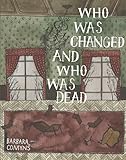 I didn’t read anything for awhile, or nothing memorable. How do you follow Ferrante? After a few weeks of false starts and Googling furiously to try and figure out Ferrante’s secret identity, I found my cure: Barbara Comyns. I knew of her from an Emily Books pick: Who Was Changed and Who Was Dead, brilliantly reissued by The Dorothy Project, and still unread by me. I have learned in my time as a reader that the writers Emily Books publishes will always be the ones people come to be obsessed with, even if it takes, regrettably, a few years. Elena Ferrante! Eve Babitz! Ellen Willis. Eileen Myles. Those are just the people whose names start with E, for fuck’s sake. Renata Adler! Nell Zink! I could go on. Resistance is foolish.
I didn’t read anything for awhile, or nothing memorable. How do you follow Ferrante? After a few weeks of false starts and Googling furiously to try and figure out Ferrante’s secret identity, I found my cure: Barbara Comyns. I knew of her from an Emily Books pick: Who Was Changed and Who Was Dead, brilliantly reissued by The Dorothy Project, and still unread by me. I have learned in my time as a reader that the writers Emily Books publishes will always be the ones people come to be obsessed with, even if it takes, regrettably, a few years. Elena Ferrante! Eve Babitz! Ellen Willis. Eileen Myles. Those are just the people whose names start with E, for fuck’s sake. Renata Adler! Nell Zink! I could go on. Resistance is foolish.
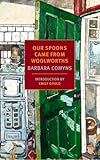 All this to say Barbara Comyns’s Our Spoons Came From Woolworths got me out of my own head and onto the couch for three hours, reading this in one setting after my son went to bed. Her voice is sui generis and I goddamn love her. She reminded me of a thing that Emily Gould — who along with Ruth Curry started Emily Books, and who also not coincidentally wrote the introduction to the edition of the book I was reading — told me once when I was having a crisis of confidence. Okay, a crisis of jealousy. She said something like, with regard to writing, it’s useless to be jealous because, “No one can ever be better than you are at being you.” No one else can be better than Comyns is at being Comyns, that is no one can write like Comyns, so I ordered her book The Vet’s Daughter and inhaled that one, too. I need more.
All this to say Barbara Comyns’s Our Spoons Came From Woolworths got me out of my own head and onto the couch for three hours, reading this in one setting after my son went to bed. Her voice is sui generis and I goddamn love her. She reminded me of a thing that Emily Gould — who along with Ruth Curry started Emily Books, and who also not coincidentally wrote the introduction to the edition of the book I was reading — told me once when I was having a crisis of confidence. Okay, a crisis of jealousy. She said something like, with regard to writing, it’s useless to be jealous because, “No one can ever be better than you are at being you.” No one else can be better than Comyns is at being Comyns, that is no one can write like Comyns, so I ordered her book The Vet’s Daughter and inhaled that one, too. I need more.
As the year comes to an end, this is all I want, to read books that aren’t the key to anything except themselves. Mary Gaitskill’s The Mare made me sad and anxious. I am waiting for David Copperfield to come in the mail.
More from A Year in Reading 2015
Don’t miss: A Year in Reading 2014, 2013, 2012, 2011, 2010, 2009, 2008, 2007, 2006, 2005
The good stuff: The Millions’ Notable articles
The motherlode: The Millions’ Books and Reviews
Like what you see? Learn about 5 insanely easy ways to Support The Millions, and follow The Millions on Twitter, Facebook, Tumblr.









